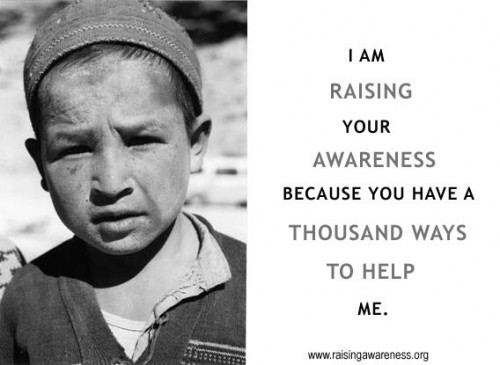
Sometimes, but maybe not as well as we’d like to think.
I work in a downtown pedestrian area, and on any given walk to a coffeeshop or lunch spot, if the weather’s nice there will be environmentalists, Global Medical Brigades reps, pro-Tibetans, and other generally worthy and important causes. ‘Did you know…”. I can say, personally, that I do know, most of the time, what’s going on – I just tend not to act on it. I know the environment’s deteriorating but am often too lazy to recycle, etc.
The assumption behind raising awareness is that if more people know about an issue, they’ll act on it. Though this assumption isn’t altogether wrong, it could be misguided from a Christian perspective. Its anthropology is too high; it treats ignorance of major issues as incidental. It’s vaguely reminiscent of the Greek idea that lack of virtue is merely ignorance, and those who know ‘the good’ will act in accordance with it. Christianity, by contrast, takes a different view – people generally know the good (Rm 2:15, 7) but fail to do it (Rm 7). Pictures like the one below raise an urgent, real, important moral obligation… but I, for one, squirm rather than rush to give. And if it seems rude or grating or inappropriate, it probably is, but people do it everyday.
From the viewpoint of a compromised will, lack of knowledge is only the most superficial element of our problem, and learning something only condemns us, because it reveals and enacts our unwillingness to do what we know we should. This gives us a great deal of guilt, so we often try to mitigate or forget this law which condemns us. In the present context, this implies that our ignorance is often willed; if I can forget about the problems of Tibet, I feel less guilty for my failure to address them. Additionally, there are so many causes out there that I could never address them, and in the weight of that total demand, total paralysis (just forget about all that) or narrow ideology – my cause is really the one that matters – cannot help but result.
For awareness-raisers and grassroots activists, a takeaway from this low anthropology is that their message of truth (genuinely important, pressing issue) will only be heard if the guilt which makes us push that message away is somehow addressed or removed.
Christianity not only teaches on this issue, but also may learn. The same assumption – people who know the good will tend to do it – drives much of the Church’s moral exhortations, whether for daily quiet time or boundaries in relationships or social justice. There are two possible misapprehensions at work here: first, too weak a trust in the truth that we mostly do know the good already, and second, an overestimation of our willpower to do that good. And these perhaps give way to a third problem, which is an implicit denial of the fact that people’s resistance to a moral message is not caused primarily by intemperance or lust, but something deeper, pride, which finds expression in our resistance to guilt.
The ancient Greeks on this point can make a positive contribution: everyone has an interior sense of guilt or failing in some arena of life, which can be addressed, recollected. The pastor’s preaching of law entails midwifing this guilt, interpreting someone to herself, exegeting the pains of conscience. Such a law can be tailored to specific circumstances in a congregation or individual. And even this making-clear of interior guilt may meet resistance, an inability to receive a missive from the conscience. Sometimes, even that perhaps can only be enabled by a prior grace, which creates space for repentance. Cue Robert Rule:
Unfortunately, the message of preaching grace first may well be open to the same criticism – does merely knowing that exhortation sometimes avoids the root problem help us to avoid it? Aren’t people overly moralistic in part because they feel guilty? And does lambasting the moralist on the Internet address the root issue? It’s a valuable consideration to keep in mind… but luckily, and more fundamentally, even the rhetorical task is out of our hands. God’s Spirit may work in theology erring on the side of moralism or on the side of hopeless apathy. As much as we may try to find a ‘third way’, both errors are components of the ‘all things’ from Romans; if we take the Holy Spirit seriously, it works in each.
“Anyone who is not against us is for us”, Jesus said. And even if raising awareness about, say, poverty in Africa falls unnecessarily into legalism… well, someone may be fed for a year, or two, even if guilt-tripped philanthropy doesn’t stand the test of time. Which is to say, grace isn’t primarily about forcing ourselves to avoid legalism. It’s more about a world outside the self, one that relativizes even our need to get things right, theologically. With regard to Providence, grace is a word promising that God is working, regardless of what paradigm we’re using to describe it.

COMMENTS
3 responses to “Does Raising Awareness Work?”
Leave a Reply














That last paragraph is absolutely stunning, Will. Thank you so much for this.
This is truly a great post! These kinds of “awareness raising” efforts really do serve to make me feel more guilty about ignoring them, and the problem really is not simple awareness. You’re right about asserting grace as the answer – sometimes I see people get a guilty feeling because they are not living enough from grace. What a strange problem!